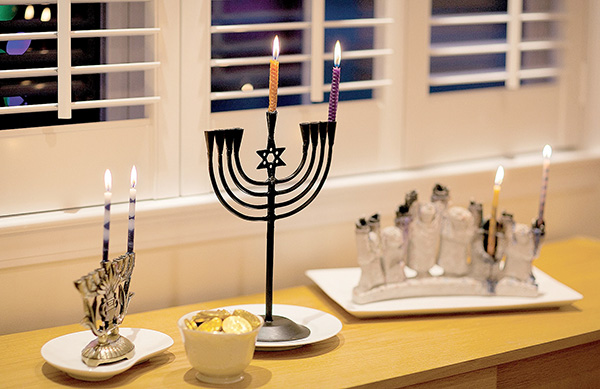By Judy O’Gorman Alvarez

This week many families will display their menorahs, a prominent symbol of Hanukkah, in their homes. Menorahs have been used in Jewish worship since ancient times.
As Jewish families everywhere prepare for Hanukkah, which begins at sundown Sunday, Nov. 28 and lasts until sundown Monday, Dec. 6, many are finding their celebrations and traditions may have changed over the years. Hanukkah is the Festival of Lights. It commemorates the victory of the Maccabees over the Syrian Greek army, and the miracle of rededicating the Holy Temple in Jerusalem and restoring its menorah – or lamp.
The miracle of Hanukkah is said to be that only one vial of oil was found with just enough left to illuminate the temple lamp for one day, and yet it lasted for eight full days. But as Rabbi Marc Kline of Monmouth Reform Temple in Tinton Falls points out: “It’s not even a holy day. It’s a day that commemorates the return of light, no different than Christmas.” The Maccabean war, he said, could not have taken place in December because they didn’t fight wars in December just as “we know that Jesus was born in the spring and not in December. “I don’t want to debunk either because both celebrate the fact that there’s light and these solstice festivals celebrate the day starting to get longer and that we have more light in our lives.” Hanukkah is Hebrew for “dedication.” During the holiday people are encouraged to remember that dedication. “We have to remember that life is what we’re supposed to do and what we’re supposed to bring to the world,” said Kline. “So with the story of the menorah, the oil that lasted longer, the idea is that our job is to make the world brighter. And you do that with faith. You do that with taking care of each other. That’s the purpose of the holiday.”
Many people find that with all the holiday events, decorations and shopping, it’s easy to forget the meaning of Hanukkah. “Purim is really the gift-giving holiday in our Jewish tradition,” said Kline. “And the gifts you give are cakes and cookies, not Xboxes. The idea that people go into debt – long-term debt – to wrap something for a holiday is just crazy in any religious world.” Yet this year Kline senses there may be a change in feelings.“I think people have started to think that there has to be more to life than what I have or what I can get,” he said. Instead, he said he notices spiritual engagement is what many people – of all generations – are seeking. “Our synagogue has had some extreme growth during COVID, at a time when a lot of houses of worship are closing because the people aren’t there to support it financially. But the places that are doing the things that demonstrate spiritual value are doing well because people want to find meaning in their life,” he said. “They may not come to a sanctuary for a worship service, especially while they were all closed, but they’re going to find themselves involved in studies or in engagements taking care of the needy or cleaning up the environment. Those are faith-based engagements.” “So we find people who may not be coming to religion for the traditional religious stuff, but they’re looking for a spiritual engagement that helps them feel that they’re contributing more and they’re getting more from societal life.”
Kline said he thinks many faiths are experiencing that response. “My expectation is that for Hanukkah and for Christmas, there’s going to be a greater emphasis on the reason for the holidays, and less about the stuff of the holidays.” Rabbi Douglas Sagal of Congregation B’nai Israel in Rumson echoes a similar sentiment about Hanukkah. “I think that there has been, in general, a greater move on the part of many people, not just Jewish people, but many people, to embrace more religious tradition and try to live more spiritual lives,” he said. Sagal has been a rabbi for 30 years and has noticed over the past couple of decades worshippers embracing the rituals of Hanukkah, beyond gift-giving. “Although Hanukkah is a relatively simple holiday, compared to some of our other observances, I’ve seen many families try to embrace the celebration of Hanukkah more completely,” he said. “That means purchasing beautiful Hanukkah menorahs to help enhance the holiday, to learn Hanukkah prayers and songs, to invite friends over, or join Hanukkah celebrations to embrace the foods of Hanukkah – like potato pancakes and jelly doughnuts – maybe a little more completely.”
Hanukkah has always been a holiday that was important in the Jewish calendar. And the idea of gift-giving on Hanukkah actually goes back a long time. “I think there was a time maybe 20 or 30 years ago, when a lot of rabbis may have tried to downplay Hanukkah, because of its proximity to Christmas,” said Sagal. But he points out that practice has fallen out of favor. “I think people are embracing Hanukkah as an important holiday in its own right.” “So what I see among many folks who are of Jewish faith is essentially an attempt to be more observant of all the traditions and customs and to make it an even more important part of their spiritual life and the life of their family, which to me is a really welcomed.”
The article originally appeared in the November 24 – December 1, 2021 print edition of The Two River Times.














